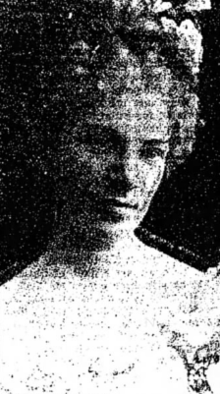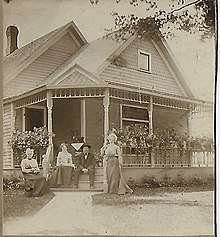Effie F. Kamman
Effie F. Kamman (1868-1933) was an American composer, pianist, music teacher, and vaudeville performer. She was known for composing "The Dance of the Brownies" (1893), a popular tune inspired by the children's books by Palmer Cox.
Effie F. Kamman | |
|---|---|
 Effie F. Kamman, from an 1898 newspaper | |
| Born | 1868 |
| Died | 1933 |
| Nationality | American |
| Other names | E. F. Kamman |
| Occupation | composer, performer |

Early life
Effie F. Kamman was from Detroit, the daughter of Frederick Kamman and Minerva A. Howlett Kamman.[1] Her father was a butcher.[2]
Career

Kamman was a music teacher in Detroit, who also gained notice as a performer on vaudeville. She toured in several shows, including The Fencing Master (1894),[3] Run on the Bank (1895),[4] The Governors (1897),[5] Hunting for Hawkins (1901),[6] and On the Stroke of 12 (1903).[7] She sang soprano parts, but also sometimes toured as a "lady baritone" novelty singing act.[8][9] She was also the music and art editor for the newspaper Detroit Journal.[10] Later in her career, she played piano on radio, and in theatres during silent films.[11]
Published works by Kamman included
- "The Dance of the Brownies" (1893)[12]
- "The American Two-Step" (1895)[4]
- "Clover" (1898),
- "Darktown Doings" (1898)[13]
- "Dance of the White Rats" (1901)
- "Hunting for Hawkins" (1901)[14]
- "I Love You Yet" (1903)[15]
- "Skirmish" (1903),
- "What's Your Hurry?" (1922)
- "The Old Fashioned Love of the Days Long Ago" (1928)[16]
- "In Twilight Land" (1928)[17][18]
Personal life
Effie F. Kamman lived in Los Angeles, California, for several years, until shortly before her death.[19][20] She died in 1933, aged 64 years, in Detroit. Her gravesite is with her parents' and her sister's, in Michigan.
References
- "Second Victim in Family". Detroit Free Press. August 10, 1906. p. 11. Retrieved July 22, 2019 – via Newspapers.com.
- Detroit City Directories. 1879. p. 447.
- "The Stage". Detroit Free Press. August 8, 1895. p. 4. Retrieved July 22, 2019 – via Newspapers.com.
- "The Stage". Detroit Free Press. December 29, 1895. p. 15. Retrieved July 22, 2019 – via Newspapers.com.
- "Ward & Vokes". The Decatur Herald. October 12, 1897. p. 3. Retrieved July 22, 2019 – via Newspapers.com.
- "The Stage". Detroit Free Press. September 6, 1901. p. 4. Retrieved July 22, 2019 – via Newspapers.com.
- "Plays and Players". Defiance Express. September 26, 1903. p. 15. Retrieved July 22, 2019 – via NewspaperArchive.com.
- "Untitled news item". Detroit Free Press. March 24, 1899. p. 4. Retrieved July 22, 2019 – via Newspapers.com.
- "A Vocal Phenomenon". Detroit Free Press. September 18, 1898. p. 30. Retrieved July 22, 2019 – via Newspapers.com.
- "Personal". The Buffalo Commercial. November 13, 1893. p. 9. Retrieved July 22, 2019 – via Newspapers.com.
- "Miss Effie Kamman, pianist". Fulton County Tribune. October 1, 1920. p. 5. Retrieved July 22, 2019 – via Newspapers.com.
- Milan, Jon (2009). Detroit: Ragtime and the Jazz Age. Arcadia Publishing. p. 13. ISBN 9780738561134.
- "Untitled news item". Detroit Free Press. November 3, 1898. p. 4. Retrieved July 22, 2019 – via Newspapers.com.
- Catalogue of Title Entries of Books and Other Articles Entered in the Office of the Register of Copyrights, Library of Congress, at Washington. Treasury Department. 1901. p. 1409.
- "I love you yet". Historic Sheet Music Collection, Oregon Digital. Retrieved 2019-07-22.
- "Effie Kamman Puts Out Two New Songs". Detroit Free Press. May 5, 1928. p. 4. Retrieved July 22, 2019 – via Newspapers.com.
- Tjaden, Ted. Women Composers of Ragtime.
- Discography of American Historical Recordings, s.v. "Effie F. Kamman (composer)" UC Santa Barbara Libraries, accessed July 22, 2019.
- "Dance of the Brownies". The Los Angeles Times. August 29, 1931. p. 20. Retrieved July 22, 2019 – via Newspapers.com.
- "Untitled news item". Detroit Free Press. April 22, 1933. p. 8. Retrieved July 22, 2019 – via Newspapers.com.
External links
![]()
- Effie F. Kamman at Find a Grave
- Effie F. Kamman, "What's Your Hurry?" (1922), at Historic Sheet Music Collection, Oregon Digital.
- A 1922 recording of "What's Your Hurry?" (1922), at Internet Archive.